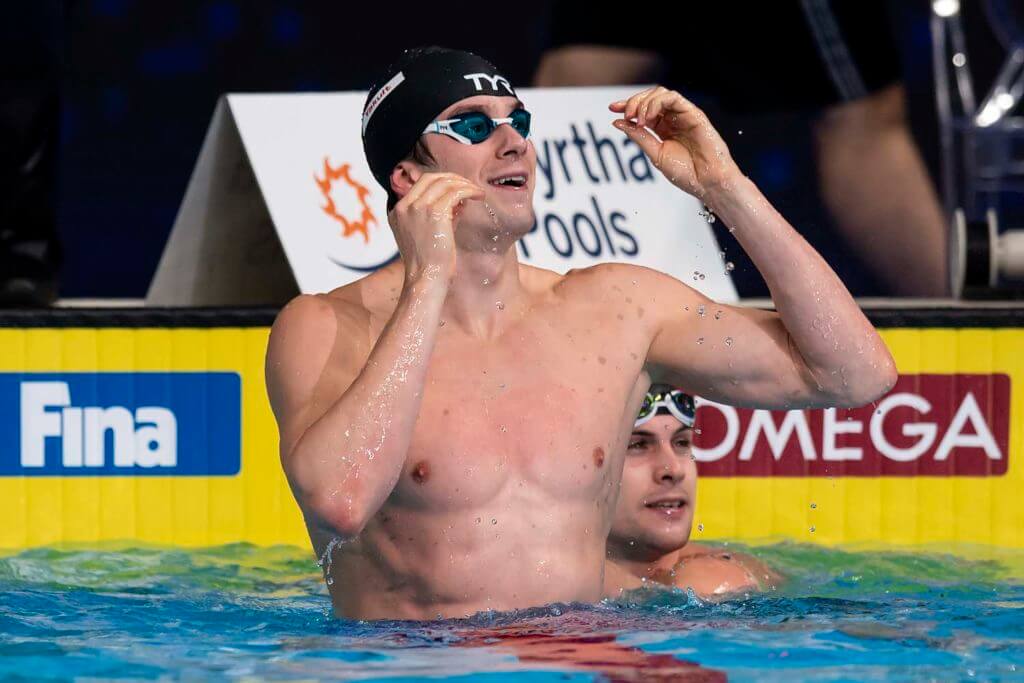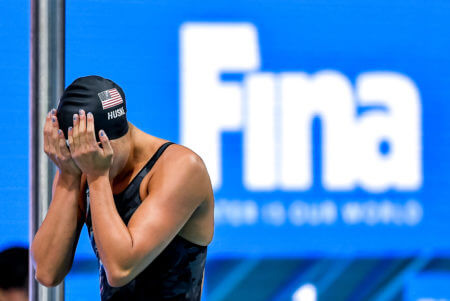Strong U.S. Team For Short Course Worlds Means More Legitimate Championships

Strong U.S. Team For Short Course Worlds Means More Legitimate Championships
Most in the swimming community will acknowledge that a world title or medal from the FINA Short Course World Championships carries less weight than the same award at the long course edition of the global showcase. That’s because short course is not the format in which the all-important Olympic Games are held and also because many of the world’s best athletes bypass the short course meet. In 2021, for instance, only four events at Short Course Worlds in Abu Dhabi included the gold medalist from the same event at the Tokyo Olympics, and the bulk of silver and bronze-medal winners were absent as well.
But the 2022 edition of the meet, set to take place Dec. 13-18 in Melbourne, Australia, is setting up much differently. Adam Peaty, the two-time Olympic champion in the men’s 100 breaststroke and world-record holder in the long course version of the event, plans to race in Melbourne for his first appearance at Short Course Worlds since he was a 19-year-old without a major international title on his résumé. Only one Australian swimmer (Holly Barratt) traveled to Abu Dhabi last year, but a strong contingent of Aussies is expected for a meet on home soil.
And the United States will sent a roster fitting for the world’s best swimming nation. This group, while missing several big names, is the most complete U.S. squad for a Short Course Worlds in years, a significant upgrade over last year’s squad.

Torri Huske will have a busy schedule at Short Course Worlds — Photo Courtesy: Andrea Staccioli / Deepbluemedia / Insidefoto
Of the 16 U.S. women who won individual medals at the long course World Championships in June, nine are on the trip to Melbourne. Sure, Katie Ledecky is missing, continuing her streak of never racing at Short Course Worlds, but three individual world champions are set for the trip: Lilly King, Torri Huske and Alex Walsh. Huske and Claire Curzan were the busiest swimmers for the Americans in Budapest, and the Stanford teammates are both skilled underwater swimmers who are just as good if not at short course as long course (if not better).
Walsh is racing at a Short Course Worlds for the first time, and so is veteran Hali Flickinger. We know from her college success how dominant a force Kate Douglass can be in the sprint relays, and Natalie Hinds will be huge there as well along with Huske and Curzan. Rhyan White is returning to the Short Course Worlds stage after claiming gold in the 200 backstroke last year. Erin Gemmell, the breakout 200 freestyler from this summer, will swim on a senior-level international team for the first time.
On the men’s side, Caeleb Dressel is an unsurprising absence since he has not competed since leaving early from the World Championships, and distance swimmer Bobby Finke is not part of the group either. But seven male swimmers who won an individual medal for the Americans in Budapest are on the team, with backstroke star Ryan Murphy leading the way. Michael Andrew will have plenty of medal chances in Melbourne, and Shaine Casas returns to Short Course Worlds with a packed lineup after his international debut last year included gold in the 100 back. Ironically, Casas is out of the 100 back this time with the Americans having Murphy and Hunter Armstrong, who won silver and bronze, respectively, at Worlds last year.
Nic Fink will be back after winning gold in the 50 and 200 breast last year and then striking gold again in the 50 breast at the long course edition of the meet. Carson Foster used Short Course Worlds last year to practice the skills that helped him to a pair of impressive silver medals in Budapest, and Foster will be even busier this time around while older brother Jake Foster joins him in the 400 IM. Individual medal chances await for Drew Kibler and Kieran Smith as well.
USA Swimming’s official selection policy for Short Course Worlds does specify that long course results are used for selection despite the meet being held in a 25-meter course. That policy does mean that some faster swimmers get left behind. Anyone who followed ISL swimming last year knows that Beata Nelson is undoubtedly one of the 30 best short course swimmers in the U.S., and a dedicated short course selection meet would likely yield additional swims for Douglass plus perhaps spots for NCAA champions Katharine Berkoff and Gretchen Walsh.
On the men’s side, USA Swimming’s decision to omit men’s 100 back world-record holder Coleman Stewart from last year’s team was criticized, and while Stewart has competed sparingly in 2022, another former NC State swimmer definitely merits inclusion. Justin Ress was the world champion in the 50 back at the long course meet in Budapest while also competing for the U.S. men on the 400 free relay. Ress is a well-known short course star with plenty of ISL success on his record. The selection procedures are clearly stated, but his presence on the team would be welcomed.
Still, this team is a strong group with individual medal contenders scattered throughout essentially every event except the distance freestyle races, and having swimmers with versatile sprint skills and NCAA racing experience is helpful in a meet with 12 relays on the program. When the Americans send a team like this to a Short Course Worlds, you know that medals are well-earned. If there is more buzz surrounding the Melbourne championships than Abu Dhabi one year ago, well, there’s good reason.
This meet was originally set to take place in Kazan, Russia, but FINA relocated the event to Melbourne in response to Russia’s invasion of Ukraine and the suspension of Russian and Belorussian athletes from international competition. Surely, the destination of Melbourne made the meet more attractive for potential participants. The average high temperature in Kazan in December is 22°F (-6°C), while Melbourne is 76°F (24°C). In the heart of winter in the Northern Hemisphere, a trip to warm and sunny Australia for a championship meet will be a nice treat.



